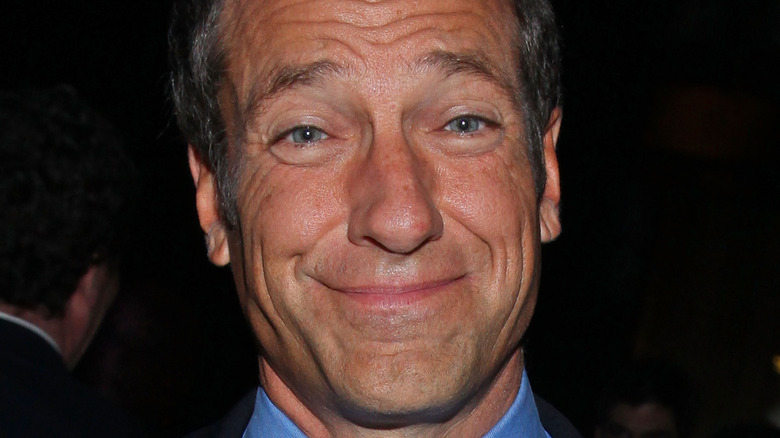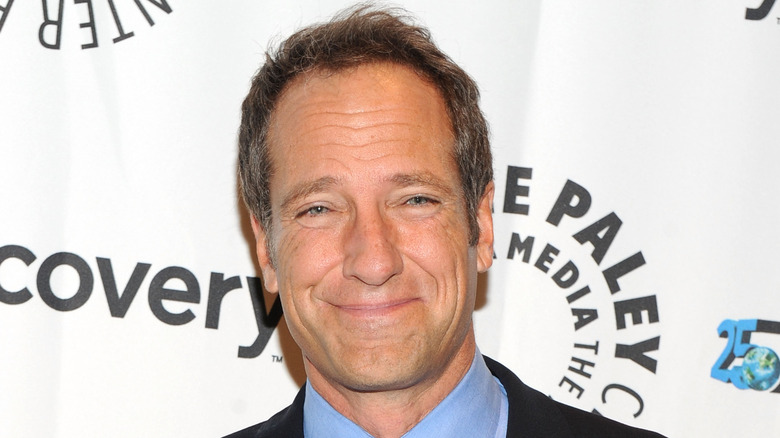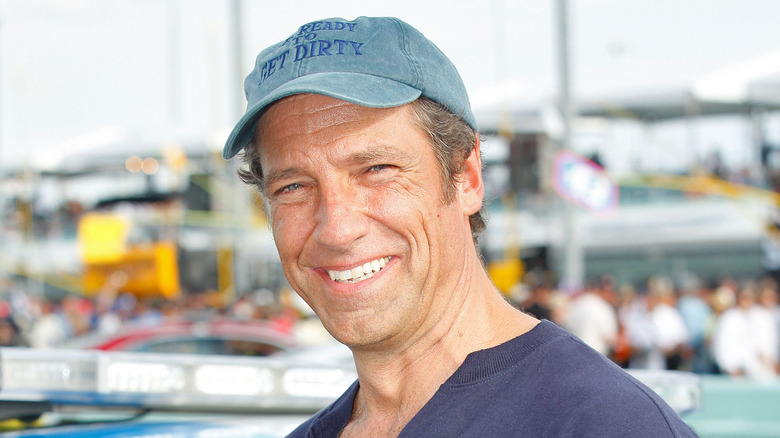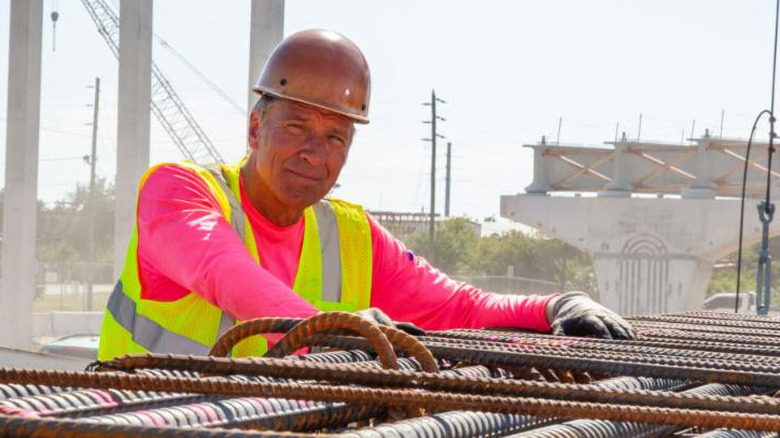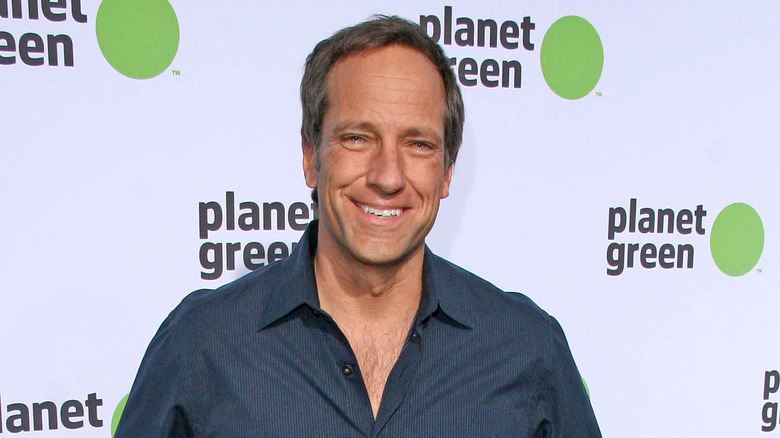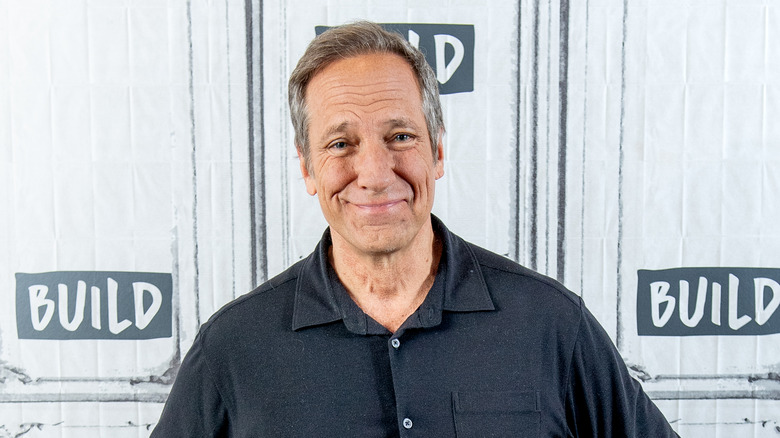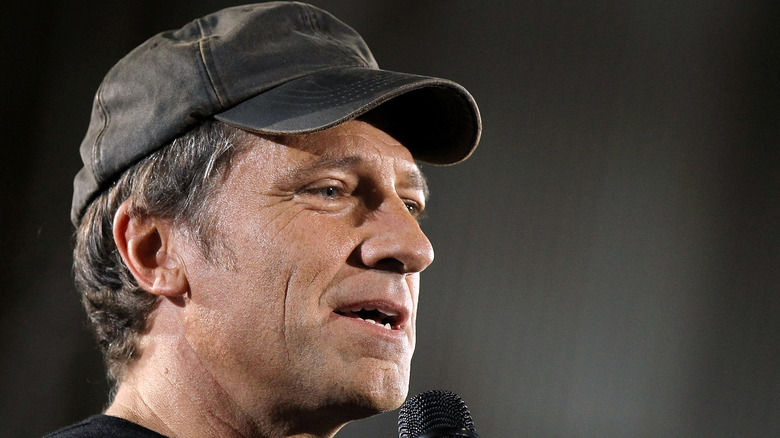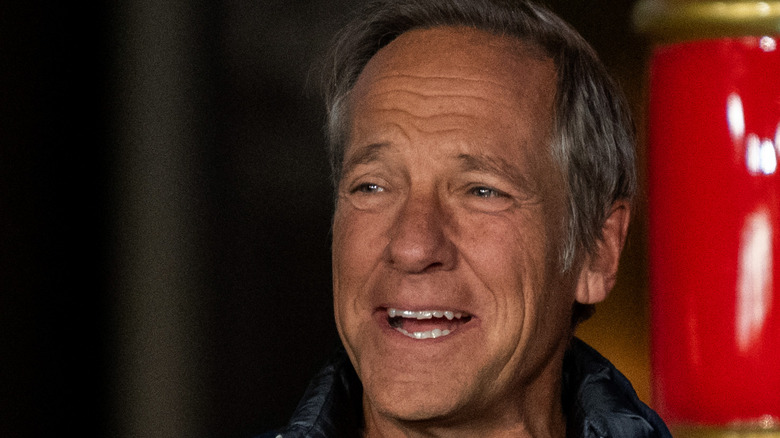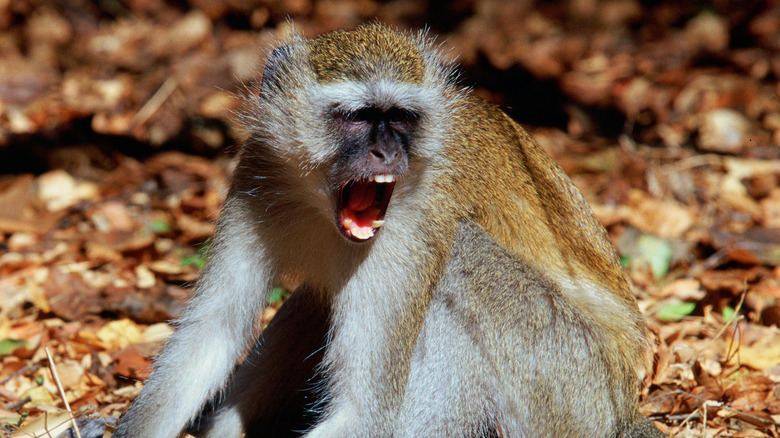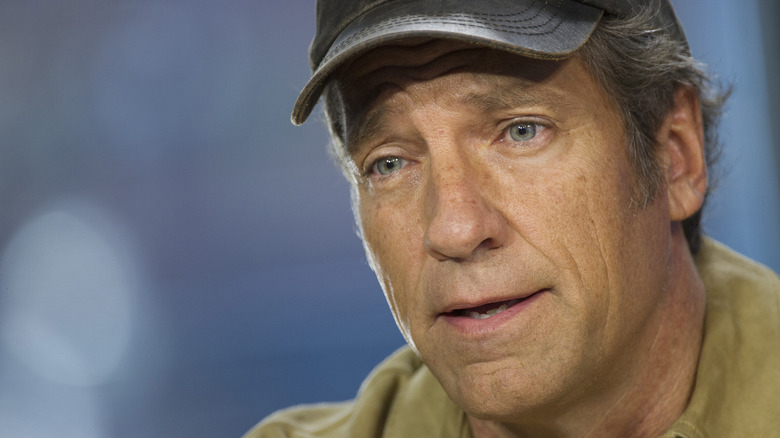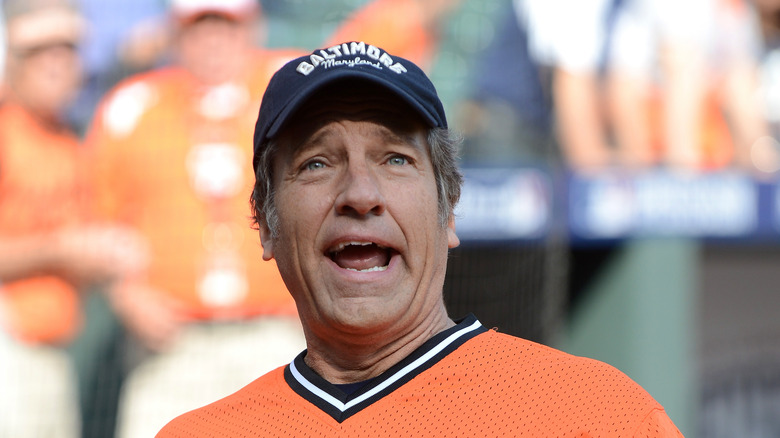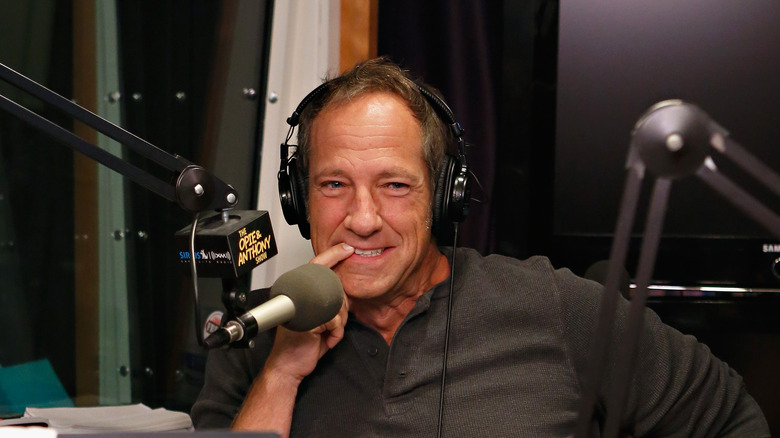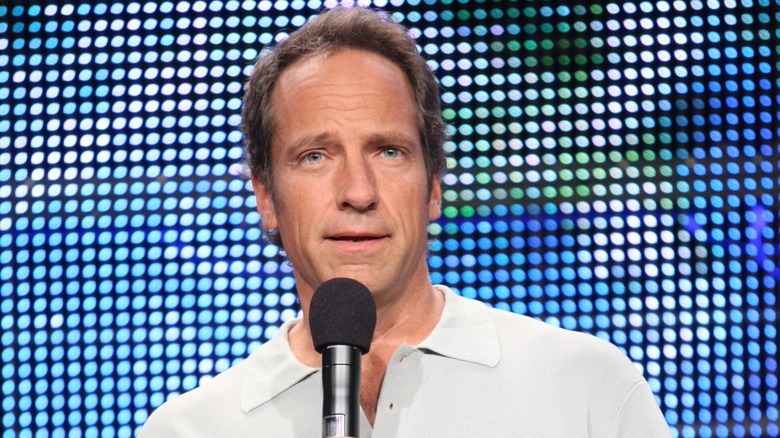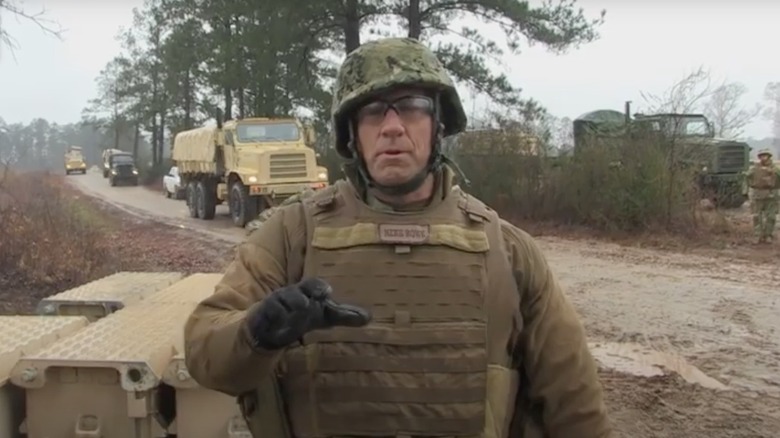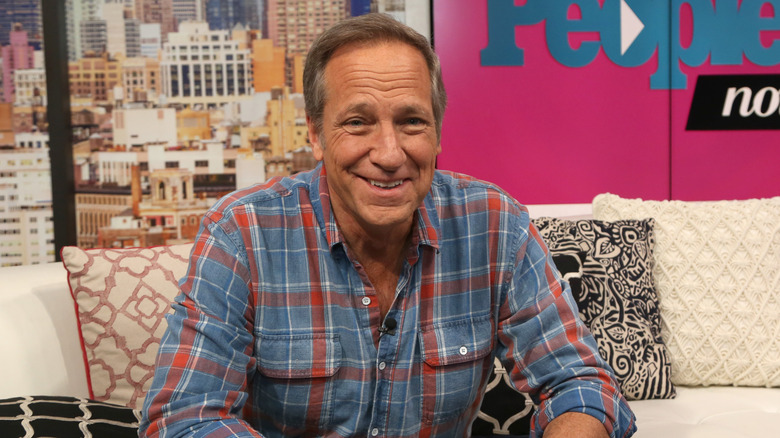The Untold Truth Of Dirty Jobs
"Dirty Jobs" made its television debut in 2003 with the first of three pilot episodes airing on Discovery. After solid ratings for those prototype episodes, "Dirty Jobs" returned in 2005 as a full-fledged series, in which host Mike Rowe learned how to do some of the toughest, nastiest, and most undesirable jobs in existence, from inspecting sewers to inseminating cattle. Viewers liked what they saw; by 2010, noted Pittsburgh Post-Gazette's profile on the show, "Dirty Jobs" had become "one of the most popular shows on Discovery" and Rowe one of TV's most familiar and beloved personalities.
In that profile, Rowe admitted that the massive success experienced by "Dirty Jobs" took him by surprise. "No one was supposed to watch this thing," Rowe mused. "When they did, obviously Discovery was, like, 'Mike, let's ride the horse that's runnin'.'" That horse kept racing until 2013, when Rowe announced that "Dirty Jobs" had been canceled.
Yet that wasn't the end of the story; in 2022, "Dirty Jobs" rose like a phoenix from the ashes of cancellation when Discovery revived the show. To find out more about this enduringly popular TV hit, read on to discover the untold truth of "Dirty Jobs."
Dirty Jobs began as a tribute to host Mike Rowe's grandfather
When Mike Rowe first cooked up the concept that would eventually evolve into "Dirty Jobs," he derived inspiration from his grandfather, a highly skilled "master tradesman" who worked with his hands. "He could take your watch apart, put it together blindfolded," said Rowe of his grandfather during an interview with "The Pursuit! with John Rich." "He could build a house without a blueprint." While Rowe initially hoped he could "follow in his footsteps" by following a similar path, he discovered he was utterly bereft of the "handy" gene that had served his grandfather so well, leading him to pursue a career on television, as he told The List.
Rowe recalled his mother calling up around the time his grandfather was celebrating his 90th birthday, and told him, "Michael, wouldn't it be great if before he died, your grandfather could turn on the TV and see you doing something that looked like work?"
That motivated him even further to get "Dirty Jobs" on the air as "a tribute to him."
Dirty Jobs originally began as a short segment for local news
"Dirty Jobs" did not arrive on television fully formed and can more properly be described as the result of an evolutionary process. As Mike Rowe wrote in a blog post, he came up with the show's basic concept while he and a TV producer brainstormed ideas for a new segment for the San Francisco newsmagazine on which they worked, whose "dwindling and narcoleptic audience" left it on the brink of cancellation. According to Rowe, he'd been reading George Plimpton's "Paper Lion," which describes the writer participating in the Detroit Lions' spring training regimen.
Taking that one step further, Rowe became intrigued by the notion of an unscripted TV experiment that revolved around "inserting myself into situations for which I was neither trained or qualified to attempt." The result was a short segment featuring Rowe, titled "Somebody's Gotta Do It." Although these segments were between three and seven minutes in length, Rowe wrote, they "were identical in style and tone" to what would eventually become "Dirty Jobs."
As Rowe recalled, the very first segment was a memorable one, focusing on the "Poo Truck Driver" for the San Francisco Zoo — and "only got weirder from there."
Mike Rowe drummed up zero interest when he first pitched the show as Somebody's Gotta Do It
Mike Rowe's "Somebody's Gotta Do It" segments took off with viewers. However, when management at the station changed, "dirty" was no longer a direction his bosses wanted to pursue. As he wrote in his blog, that shift — coupled with his conviction that the idea "deserved a bigger audience" — led him to begin shopping his idea to other television outlets. First, he sent a clip in which he learned how to inseminate cows to "Good Morning America," along "with the suggestion they hire me to host similar recurring segments for their program." He never received a response. He also sent the same tape to various other networks — none of which demonstrated any interest.
Noting that these networks all rejected him "in a variety of creative ways," his "favorite" was a letter from Comedy Central, which read, "At this time, our fall schedule does not allow for a talk show that takes place inside a septic tank."
Everything changed, however, when he partnered with TV producer Craig Piligian. Piligian brought the idea to Discovery, which extended the concept from a short segment to an hour-long show that was renamed "Dirty Jobs."
Filming Dirty Jobs was sometimes more dangerous than it looked
Anyone who watched those early episodes of "Dirty Jobs" had to be aware that Mike Rowe was placing himself in some downright disgusting situations. What they may not have realized, however, was how dangerous some of those dirty jobs actually were.
A 2008 Fast Company profile on Rowe and his "Dirty Jobs" crew noted how difficult the show was to shoot. Dan Eggiman, described as "production assistant and occasional camera operator," described his very first day on the show, which saw him crawling through muddy caves in Kentucky hauling 100 pounds of equipment.
One particularly hazardous job that Rowe attempted on the show was working with the U.S. Air Force team responsible for the maintenance of an airborne fuel tanker that allows aircraft to refuel in the sky. As reported by Australia's Channel Nine, Rowe explained that a fully loaded tanker "holds over 100 tones of highly combustible, incredible toxic" fuel, underlining just how hazardous some of the jobs depicted in the show can be.
Mike Rowe once turned down a dirty job because of ties to the mob
While Mike Rowe has undertaken all manner of unsavory vocations in "Dirty Jobs," he's occasionally had to turn some down. As Rowe explained in a Reddit AMA (Ask Me Anything) online chat with fans, he once rejected the opportunity to work in a particular rendering facility, which essentially recycles dead animals — not because the work was "optically horrific" (though it most definitely was) but for a different reason entirely, which he spelled out in three letters: "M-O-B."
According to Rowe, his reluctance stemmed from the fact that "the Mob is still involved in a surprising number of rendering facilities," although he did concede that the reason why organized crime had "such a rich history in garbage-related industries and rendering-related industries is a conversation beyond my pay grade."
Ultimately, however, he finally did manage to find a different rendering operation, North State Rendering in Northern California, which had no ties to organized crime. "To this day, I'm impressed with how brave they were in their decision to let us provide our viewers with an unvarnished look at what it takes to turn a dead cow into several hundred pounds of chicken feed," Rowe marveled.
Filming Dirty Jobs is all about expecting the unexpected
There's been much controversy regarding some so-called reality shows that have been accused of allegedly staging and scripting situations. "Dirty Jobs," by its very nature, is not one of those shows. In fact, noted Fast Company, "Dirty Jobs" is as close to reality as a television viewer can get without actually being there in person. "The crew have to show up to an unfamiliar work site and try to capture what someone does — and what they teach Mike to do — on film, without missing anything or getting sucked into some sort of machine," wrote Ellen McGirt, who spent time on location with Mike Rowe and his crew as they filmed an episode.
As McGirt pointed out, several facets of the show involve "things that only happen once," meaning camera operators need to get the shot the first time because there probably won't be a chance to get it again. According to McGirt, the process is akin to "improv theater with heavy machinery." As a result, admitted lead camera operator Doug Glover, "it's not a real visual show."
"Dirty Jobs," Mike Rowe reiterated, is "unscripted, completely organic, doing it as we go..."
Some experiences on Dirty Jobs left Mike Rowe and his crew traumatized
As viewers can attest, some episodes of "Dirty Jobs" are dirtier than others. Interviewed by Wired, Mike Rowe recalled the "pure horror" he experienced while working at a plant that converted food waste into methane. "They're basically lighting farts on fire across the street and it's enough to knock you down," he recalled.
For sheer trauma, however, Rowe admitted it was tough to the top the time he worked to retrieve a four-ton motorized pump from the bottom of a five-story shaft at a wastewater treatment facility. "Motors in the bottom, motor breaks, shaft fills with s**t, s**t falls down, people scream," he summed up the experience.
When it was all over, Rowe and the rest of the "Dirty Jobs" crew gathered at a bar, where they just stared at one another in silence for 20 seconds, processing what they'd just been through. Rowe admitted he can still remember the sound produced when the pump detached, "like a hundred yards of sticky Velcro yanked off some giant mat. It'll haunt your dreams."
A monkey once caused havoc while shooting an episode of Dirty Jobs
For Mike Rowe and his "Dirty Jobs" crew, one episode they filmed became one of their most memorable thanks to the unforeseen and totally unscripted antics of a wild primate. That, noted Fast Company, was when camera operator Chris Whiteneck was the subject of a vicious attack from a monkey that bit him on the leg while filming an episode set at a monkey sanctuary in South Africa.
In the episode, the vervet monkey — named Paddy — chomped into Whiteneck's leg after filming had completed and he was packing up the camera equipment.
Naturally, Whiteneck's injuries became part of the show, with Rowe acknowledging both the "emotional scars" and the "physical damage" inflicted by the monkey as he's filmed inspecting the scar on Whiteneck's leg months later. Rowe even presented Whiteneck with a "little memento" commemorating the incident: a banana. As Fast Company, pointed out, fans of "Dirty Jobs" who meet Whiteneck in person always ask if they can get a glimpse of his monkey-inflicted scar.
A freak Dirty Jobs accident 'fused' Mike Rowe's contact lenses to his eyeballs
It didn't take long for Mike Rowe to experience a "Dirty Jobs" injury, with the first of many taking place during the first season. While trying his hand as a blacksmith, Rowe told Entertainment Weekly, an attempt to get a shot with his "eyes to the camera" while on the other side of the blast furnace proved to be an exceptionally bad idea. "I flick the switch, and you see the flames pop up," he said. "The gas accumulates, so the flames shot out, wrapped around my head and burned my eyebrows off." The heat from the furnace, he explained, "fused my contacts to my eyes with a blast furnace" during filming. He wound up having to remove pieces of the lenses out afterward.
Looking back, Rowe told EW it was miraculous he hadn't suffered more injuries than he had, which to that point included getting stitches "three or four times," a broken rib, a broken toe, and the loss of three fingernails. Meanwhile, Rowe revealed, that shot with the blast furnace did make it into the show, "in slow motion."
Shooting Dirty Jobs is not a 9-to-5 job
"Dirty Jobs" demanded a lot of host Mike Rowe's time, taking him all over the world in search of the dirtiest jobs he could find in order to deliver fresh fodder to viewers. "I'm on the road 300 days a year on average," Rowe told Entertainment Weekly. "That's the real job, being on the road and just living that life."
Once he arrives on the job site, Rowe will typically spend one full day there — and it's definitely not a 9-to-5 experience. "The longest day we had was 20 hours," he said, explaining his philosophy that "if you can't tell the story in a day, then you shouldn't."
When filming those episodes, the goal that the "Dirty Jobs" team sought to accomplish was to realistically document the experience to the best of their collective ability. As Rowe explained in an interview with Wired, his primary agenda when filming is to have no agenda. "We're not doing a reality show, at least in the normal convention," he said, noting that they're "just there to sort of bear witness and have fun."
There's nothing scripted about Dirty Jobs — except the narration
Mike Rowe is no stranger to reality television. In addition to starring in "Dirty Jobs," his roster of screen credits includes serving as narrator of Discovery's "Deadliest Catch," a show he acknowledged is scripted to a certain degree — something that "Dirty Jobs" definitely isn't. "I'll watch the footage and sort of just talk to the picture as I'm seeing it and that'll serve as the narrative track," he told Entertainment Weekly of how his voiceover narration for "Dirty Jobs" comes together. "The stuff in the field, however, that we do on 'Dirty Jobs' is never written. Never. Nothing's written down. Can't do it."
During his Reddit AMA, Rowe pointed out that the terms "non-fiction" and "unscripted" had come to "no longer mean what they used to mean" when it came to so-called reality television. Listing several popular reality shows that actually had writers' rooms, Rowe added, "The truth is, it's become very difficult to produce a show with no second takes, and no script, because the people in charge of putting them on the air would prefer to control them, in the same way an executive might be able to control an episode of 'The Big Bang Theory.'"
Dirty Jobs inspired Mike Rowe to become an advocate for American workers
"Dirty Jobs" not only made Mike Rowe a recognizable TV personality, it also gave him even more respect for America's skilled tradespeople than he already held. That was why, he told Entertainment Weekly, the "Jobs" part of the show's title far outweighed the "Dirty." "The fact is that work is bigger than dirt," Rowe explained. "And the show isn't really about dirt and jobs, it's about work and people."
During the course of filming the series, Rowe became an outspoken advocate for those not-always-pleasant blue-collar jobs and the people who do them — so much so that in 2008 he founded his nonprofit mikeroweWORKS, devoted to steering high school students into trades such as plumbing, pipefitting, and welding.
In a 2020 interview with Family Handyman, he addressed the "concerning" gap between jobs in the trades and skilled workers to fill them. "We have 7.3 million open jobs right now, most of which don't require a four-year degree," Rowe said. "They require training, they require skill and they require a willingness to master a trade that's in demand."
When Dirty Jobs was canceled, Mike Rowe launched his own copycat show
All good things must come to an end, and such was the case with "Dirty Jobs" — but not quite. When Mike Rowe announced in 2013 that the show had been canceled, that wasn't the last that TV viewers saw of Rowe starring in a show in which he explored unique and unusual jobs. The following year, he launched "Somebody's Gotta Do It" on CNN, hearkening back to the original title he'd come up with all those years earlier for the brief segments that evolved into "Dirty Jobs."
In Rowe's new series, Rowe met people with out-of-the-ordinary jobs that were more quirky than dirty. One key difference between the two shows was that "Somebody's Gotta Do It" shifted the focus to those who did the jobs, not necessarily the jobs themselves. "It's really about the person," Rowe told TVLine of his new show.
As it turned out, viewers of "Dirty Jobs" apparently had no issues with Rowe taking his act to a different show on a different network; as Variety reported, "Somebody's Gotta Do It" pulled in a record number of eyeballs, becoming CNN's "top original-series premiere to date in the key news demo."
Why Dirty Jobs returned in 2022
While Mike Rowe continued to maintain a presence on television after the 2013 cancellation of "Dirty Jobs," in 2020, Discovery announced plans to revive the show in a new iteration, "Dirty Jobs: Rowe'd Trips." As a Discovery press release elaborated, "Dirty Jobs: Rowe'd Trip" was described as "part reunion, part road-trip, part look-back-special, and part 'where-are-they-now.'"
That series did well enough for a full-on "Dirty Jobs" revival. Discovery issued another announcement, this time revealing "Dirty Jobs" was returning at the start of 2022. "Just when I thought I was out, they pulled me back in!" quipped Rowe, referencing Al Pacino's Michael Corleone in "The Godfather Part III." According to Rowe, he'd "been flattered over the last year by hundreds of letters from loyal fans, urging me to reboot the series," and was giving those fans what they wanted by introducing "a new batch of hardworking Americans who aren't afraid to get dirty."
Discussing the new "Dirty Jobs" with TVLine, Rowe singled out the biggest hurdle he saw to rebooting the show. "The challenge now is not to get dirty and work hard; the challenge is to apply it to jobs that we haven't done," said Rowe.
